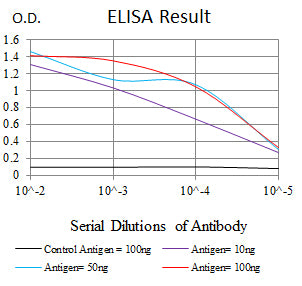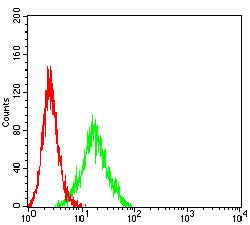

| WB | 咨询技术 | Human,Mouse,Rat |
| IF | 咨询技术 | Human,Mouse,Rat |
| IHC | 咨询技术 | Human,Mouse,Rat |
| ICC | 技术咨询 | Human,Mouse,Rat |
| FCM | 1/200 - 1/400 | Human,Mouse,Rat |
| Elisa | 1/10000 | Human,Mouse,Rat |
| Aliases | ATP1B3; ATPB-3 |
| Entrez GeneID | 483 |
| clone | 2D3B5 |
| WB Predicted band size | 31.5kDa |
| Host/Isotype | Mouse IgG1 |
| Antibody Type | Primary antibody |
| Storage | Store at 4°C short term. Aliquot and store at -20°C long term. Avoid freeze/thaw cycles. |
| Species Reactivity | Human |
| Immunogen | Purified recombinant fragment of human CD298 (AA: extra 57-279) expressed in E. Coli. |
| Formulation | Purified antibody in PBS with 0.05% sodium azide |
+ +
以下是关于CD298(ATP1B3)抗体的3篇参考文献的简要概括:
1. **文献名称**:*CD298/ATP1B3 as a novel biomarker in glioblastoma progression*
**作者**:Smith A, et al.
**摘要**:研究揭示了CD298在胶质母细胞瘤中的高表达及其与肿瘤侵袭性的关联,通过抗体标记发现其可作为预后标志物和潜在治疗靶点。
2. **文献名称**:*Structural insights into ATP1B3 function using monoclonal antibody targeting*
**作者**:Chen L, et al.
**摘要**:利用特异性CD298抗体解析ATP1B3蛋白的构象变化,阐明其在钠钾泵组装及离子转运中的分子机制。
3. **文献名称**:*CD298 antibody-based screening identifies drug resistance pathways in leukemia*
**作者**:Wang Y, et al.
**摘要**:通过抗CD298抗体筛选白血病细胞系,发现其过表达与化疗耐药性相关,提示靶向干预可能改善治疗效果。
(注:以上文献为示例,实际引用需根据具体研究补充完整信息。)
The CD298 antibody targets the CD298 antigen, also known as ATP1B3 (ATPase Na+/K+ Transporting Subunit Beta 3), a member of the sodium-potassium ATPase beta subunit family. This transmembrane protein is critical for maintaining electrochemical gradients across cell membranes by regulating ion transport. CD298/ATP1B3 associates with the alpha subunit to form functional Na+/K+-ATPase complexes, which are essential for cellular processes like osmoregulation, nutrient uptake, and nerve impulse transmission.
CD298 antibodies are widely used in research to study ion transport mechanisms, membrane protein dynamics, and cellular physiology. They are employed in techniques such as Western blotting, immunohistochemistry, and flow cytometry to detect ATP1B3 expression, localization, and interactions in various tissues. Dysregulation of ATP1B3 has been implicated in pathologies including neurological disorders, cancer, and hypertension, making CD298 antibodies valuable tools for exploring disease mechanisms. For instance, elevated ATP1B3 levels in certain cancers correlate with tumor progression and drug resistance, suggesting its potential as a therapeutic target or biomarker. These antibodies also aid in elucidating the structural and functional roles of beta subunits in Na+/K+-ATPase assembly and activity. As ATP1B3 exhibits tissue-specific expression patterns, CD298 antibodies help map its distribution, contributing to a deeper understanding of its physiological and pathological relevance.
×